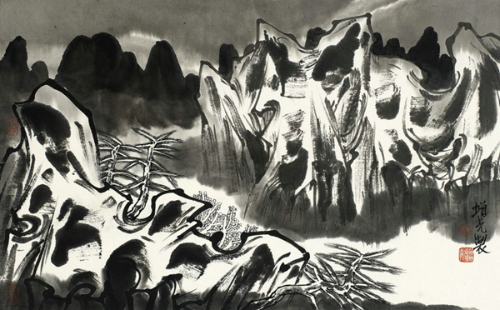Ding Liren: 9 things you need to know about China's world chess champ
China's Ding Liren was crowned the 17th world chess champion on Sunday after beating Russian-born Ian Nepomniachtchi in a tense 20-day stand off in Kazakhstan.
The young man's triumph means China now holds both the men's and women's world titles. But what do we really know about the chess grandmaster?
Here are nine curious qualities and facts about China's first male world chess champ:
1.) He takes risks - but plays it safe
Ding is a player who isn't afraid to take risks, Emil Sutovsky, the head of the International Chess Federation, tells CGTN Europe. But that doesn't mean he isn't playing safe.
The Israeli chess Grandmaster, who presides over the world's top chess body, says Ding's style means "making moves which look very dangerous. He is walking a path where one single inaccuracy in the calculation may lead to a loss, not just a draw."
However, he adds that the Chinese international counters this approach by playing with "the utmost position." Sometimes taking such risks doesn't pay off, says Sutovsky, but because Ding is such a strong player, it usually works out for him.
"This type of player requires the utmost responsibility because one single error in the calculation may lead to a loss," he says. "He made a move which to humans looked very unnatural and even bad, but it turned out it was the best move, and not only the best move, but the one which took his opponent out of his comfort zone."
No risk, no reward!
2.) He's genuine
Ding has been a star in the chess world since a very young age, but it hasn't stopped the grandmaster from being humble away from the board.
Apparently he never refuses requests for autographs or group photos from chess fans. And according to Sutovsky, the fact that he's remains so unaffected has boosted his popularity.
"He's a person who doesn't put on the mask of a superstar," says the FIDE boss. "And then he's very candid... He is ready to talk about the problems he has or discomfort or his emotions when he wins. He cries after a game."
That's why Sutovsky says the 30-year-old is such a great ambassador for the game. "In today's world, we have a lot of fake emotions, but he is very genuine."
3.) He started winning early
Ding is still a young man, but he's very much used to winning, and that started early on.
He first won at China's national junior chess championship at the age of five while competing against other players his age. He would go on to top his age group many times over at the junior championships well into his teens, helping to solidify his status as one of China's chess prodigies.
However, his breakthrough performance came at the Chinese Chess Championship in 2009. At the age of just 16 years old he shocked the chess world by beating several experienced grandmasters to win the tournament, becoming the youngest Chinese chess champion in history.
4.) He's named after a Confucian saying
Ding was born in China's Wenzhou in 1992. His parents named him 'Liren,' picking the word from their favorite Confucian saying: "Now the man of perfect virtue, wishing to be established himself, seeks also to establish others; wishing to be enlarged himself, he seeks also to enlarge others."
5.) He's a successful scholar
While Ding rose through the chess ranks, it was also apparent he was a solid student with academic promise.
His father, Ding Wenjun, says that before 2009, he and his wife had considered the now reigning world champ to be "a student who could play chess."
But after his success in the Chinese Chess Championship, they felt that "the positioning may have to be changed to a student-type chess player."
Ding took a year out after school to devote himself to the game, but says that during that time, he always felt like he way missing something. That pushed him to return to his studies.
So he took up the subject he'd always been interested in, law, going on to earn his undergraduate degree from Peking University.
6.) He travels with a cooking pot
Speaking to CGTN Europe in an exclusive interview last year, Ding spilled the beans on some of his creature comforts when he's away from home.
Whenever he travels abroad, he brings a pot to cook his porridge in. "I was too lazy to go out to eat at noon!" he said.
The chess champ also tends to take books with him. He likes reading novels, having particularly enjoyed Elena Ferrante's Neapolitan Quartet.
The things he tends to miss the most when away from home are walking near his house and eating a small yellow fish dish that he likes to eat in Wenzhou (when he's in Europe, he likes to stock up on paninis and lasagne).
7.) He admires his European competitors' creativity
While Ding is known for his unconventional chess moves, he says he admires his European competitors' creativity.
"European players may be a little bit more adventurous in their play, compared to us," he told CGTN Europe last year.
"Sometimes, I think we, like I used to, will open very carefully and play our own prepared moves. We will not go to unfamiliar territory that neither side is familiar with…but European players are kind of creative or adventurous, and they sometimes play out of the box, with new innovations."
It appears that Ding has successfully worked such strategies into his own game now...
8.) He's completed China's decades-old 'four-step chess strategy'
While China now boasts some of the world's best chess players, the game's popularity there is relatively new.
It only joined the International Chess Federation in 1975, but that didn't stop its grandmasters from aiming high. In 1986, when the Chinese Chess Association was formally established, its training team gathered in Beijing and worked out a "four-step" strategy which has in various forms been carried through all the way to 2023.
The first step was to win the women's individual world championship; the second, to take the women's team world championship; the third, to work towards the men's team world championship; and finally, to win the men's individual world champion.
After nearly 40 years, Ding has brought that dream to fruition.
9.) He understands the importance of aesthetics
While Ding's success can be attributed to his natural skill, hard work, and the efforts of his fore-bearers to put China on the chess map, he has some surprisingly simple advice for those wanting to get into the game.
"For beginners, you have to buy good looking chess pieces," he told CGTN. "Go into the game from a point of appreciation first, and get some fun and pleasure out of it."





 play
play